India’s progress on global cryptocurrency governance remains stagnant despite holding the Group of 20 (G20) presidency for nine months, former finance secretary Subhash Chandra Garg told Forkast.
“The situation regarding global governance and regulation of cryptocurrencies and the other decentralized digital assets is practically at the same stage at which it was when India assumed the G20 presidency. So not much has happened and this is likely to be the case for quite some time,” said Garg.
India commenced its G20 presidency in December 2022 and will pass the mantle to Brazil at the end of November 2023. Throughout its Presidency, several top government officials, including India’s finance minister and prime minister, have said several times that a common global regulatory framework needs to be put in place.
The G20 discussions are significant since India has long viewed digital assets with suspicion. The Indian cryptocurrency and blockchain industry had been hoping the world’s biggest democracy would address the new asset class with clearer regulations, using the opportunity during its G20 presidency to work with other countries.
Amitendu Palit, a senior research fellow at National University of Singapore’s Institute of South Asian Studies, pointed out the inherent limitations of the G20’s mandate.
“The G20 is not empowered to make binding regulations. It can, at best, provide policy suggestions and policy directions for global adoption. Regulations would have to be implemented by members themselves,” Palit told Forkast.
In August, India’s crypto regulatory note proposed global crypto regulations, but crucial details remain vague, leaving crypto market participants in the world’s most populous nation in the lurch. Despite calls for a unified global framework from top Indian officials, including Prime Minister Narendra Modi and Finance Minister Nirmala Sitharaman, tangible progress remains absent.
Garg’s prognosis for India’s crypto roadmap is bleak, especially with the country’s G20 presidency nearing its conclusion.
“The finance ministers, who were handling cryptocurrencies, already had its last meeting [in July] and there was no consensus on doing anything regarding governance of cryptocurrency,” Garg said. “The government has been taking measures which have diminished or hurt the industry. So I don’t think the government is favorably disposed towards [cryptocurrencies].”
India’s crypto tax policy, which includes a 30% flat tax on crypto earnings and a 1% tax deducted at source on substantial trades, coupled with penalties ranging from financial fines to potential imprisonment, has significantly impacted its crypto industry.
I don’t think blockchain can develop without a very positive regulatory structure and legal regime in respect of crypto and Web3
India’s former finance secretary Subhash Chandra Garg
“We don’t expect any free rides from the government, but we expect the government to be a little bit more fair. And I think that will happen over a period of time. We could debate whether it is happening at a rapid pace. Things could be better, no doubt, but things could be a lot worse also,” Rajagopal Menon, vice president of Indian crypto exchange WazirX, told Forkast.
A study from Esya Centre, an Indian policy think tank, revealed that the prevailing tax regime might lead to a loss of about US$1.2 trillion in trade volume on domestic exchanges over the coming four years. Following the imposition of stringent tax measures in February 2022, approximately US$3.85 billion has already migrated to overseas platforms, as of October last year.
Finance Minister Sitharaman has said that blockchain technology has its own uses and potential, and that India is not against the technology. She also sees 46% growth in blockchain technology use in the next few years, but cautioned that [crypto]currencies have to be monitored by either the government or the central bank.
“These statements that ‘blockchain is fine but cryptocurrency is not,’ these are contradictory terms. I don’t think blockchain can develop without a very positive regulatory structure and legal regime in respect of crypto and Web3,” Garg said.
“Imposing taxes and getting crypto under PMLA [Prevention of Money Laundering Act) are all baby steps towards regulation. Things are bound to improve in the long run,” WazirX’s Menon said.
“We’ve seen crypto companies blowing up, lawsuits, large exchanges under tremendous pressure. But what is new now is the determination of governments to regulate crypto. Earlier, they had more of a ‘ignore it – it’s not that important’ attitude. This is a major shift that the industry is witnessing,” Menon added.






